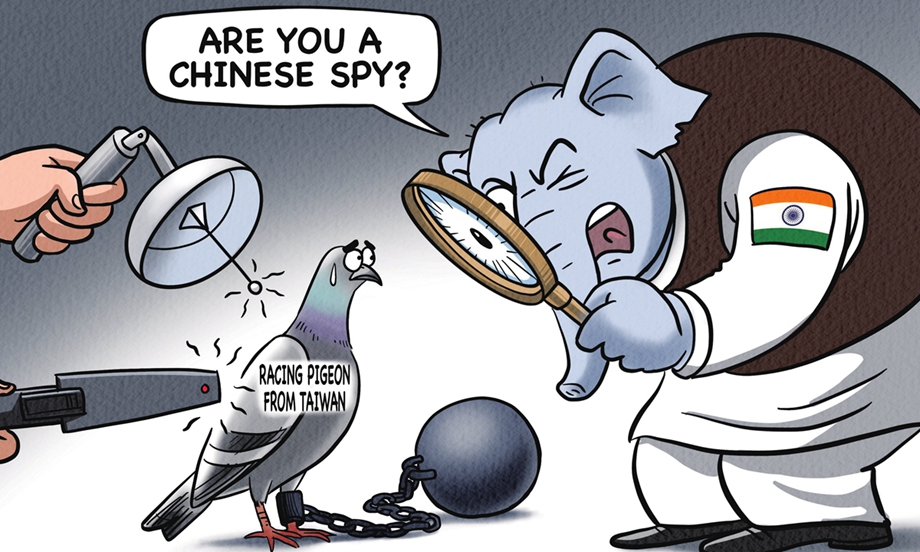Is India 'scared of' China? Here is our perspective

Illustration: Liu Rui/GT
According to some US media outlet, during her visit to Nepal a few days ago, Sun Haiyan, deputy head of the International Department of the CPC Central Committee, publicly said for the first time that some countries are trying to sabotage China-Nepal relations. She did not single out any particular country, but the media report cited an Indian scholar saying that the statement was directed at India and the US to some extent.
Strictly speaking, this isn't news. Regardless of whether Sun said this, it is a reality that has occurred in Nepal and other South Asian countries in recent years. The US, which considers itself as the world's hegemon, competes with China for influence globally. India, which sees itself as the hegemon of South Asia, views South Asia as a forbidden area and fortifies against China in every aspect. The approaches and means employed by Washington and New Delhi to maintain their self-proclaimed hegemony are nothing more than to sow discord between China and smaller countries, coercing and inducing them, and creating gaps and obstacles in their mutually beneficial relations with China.
We won't talk about the US here. But the model of coexistence between China and India does not have to be like this at all. We have always said that the dragon and the elephant should and can coexist. The worst outcome is to fall into the "dragon-elephant dispute" that has long been preset by US and Western public opinion. However, India does not share the same viewpoint, and the nature and mentality reflected in its foreign policy are highly competitive and even confrontational. This can be clearly seen in India's recent handling of relations with neighboring countries such as Nepal, Sri Lanka and the Maldives. Even India's deployment of naval power in the Red Sea has been interpreted by US and Western public opinion as a result of "the growing competition with China.
On many issues, New Delhi demands and pressures its South Asian neighbors to "choose sides" between China and India. This shows, first of all, disrespect for the sovereignty of these countries, and secondly, a distortion of China-India relations. The American media reported an interesting incident in recent days. Because a pigeon's legs were found tied with rings carrying words that looked like Chinese characters, Indian police suspected it of spying for China. The pigeon was detained for over eight months until it was discovered that it was actually a racing bird from China's Taiwan region. This incident reflects India's overly suspicious and paranoid attitude toward China.
In the past decade, India has not only detained pigeons suspected of being spies on multiple occasions, but also eagles, monkeys, and other animals, most of which were suspected to be spies from Pakistan, India's "archenemy." This "Chinese spy pigeon" incident is indeed very rare. This dramatic incident is not a coincidence and, to some extent, reflects the shift in New Delhi's strategic focus and the deep vigilance some Indians have toward China, accompanied by a certain degree of hostility.
Indian Foreign Minister S. Jaishankar said on January 30 during an interaction with students at the Indian Institute of Management Mumbai that India shouldn't "be scared of" China. He noted that India has the capability and confidence to compete with China and is in a very advantageous position in many aspects. Obviously, this is said for the domestic audience in India, but it immediately raises questions from Chinese people. Why used the term "be scared of"? What is India "scared" of China? Are Jaishankar's remarks meant to encourage India? Does this encouragement convey positive energy in China-Indian relations?
We also want to say that India shouldn't be "scared of" China, but the meaning behind this statement is fundamentally different from Jaishankar's. There is no need for India to fear China at all. Instead, China and India can and should be partners, not rivals or enemies.
Indian Ambassador to China Pradeep Kumar Rawat said in a meeting with Liu Jianchao, head of the International Department of the CPC Central Committee, on January 24 that differences are not the mainstream of India-China relations. He hoped that both sides can find a way to cooperate and coexist, move forward hand in hand, bring benefits to the two peoples, and contribute to regional and world peace and development. We also hope that this attitude and perspective can be more implemented in India's policy toward China.








